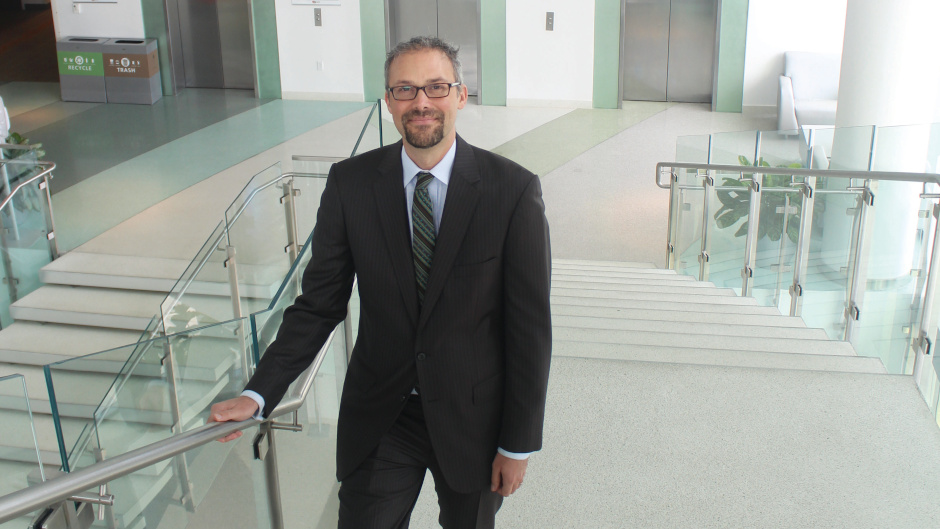Andrew Elmore started out of law school on a small stage, creating a legal aid clinic on Staten Island to help people who often lack a voice in the workplace, such as day laborers and home health workers. The native New Yorker soon realized that he could have a bigger hand in protecting the rights of low-wage workers as a section chief for the labor and civil rights bureaus of the New York State Attorney General.
“It was a larger landscape, a broader canvas and it also showed me how the work of lawyers can shape society,” he says. “That led me to become interested in joining a national conversation about what workers’ rights mean in our contemporary workforce. Recent shifts in the demographics of workers and the structure of work—and recent social movements from Fight for $15 to #Me Too—pose urgent questions about how to effectively regulate the workplace.”
Move to a Familiar Setting as New Miami Law Faculty Member
Elmore recently joined the faculty of Miami Law as an associate professor in his areas of expertise: torts, labor, and employment law. Elmore comes to Miami from New York University School of Law where he was an acting assistant professor.
“I’ve always loved Miami,” Elmore says. “My father graduated from Coral Gables High School so even though I grew up in Dobbs Ferry, New York, we spent a lot of holidays here. What’s been so exciting in coming here is learning about Miami, a city that is quite international and cultured but also which has a very high poverty rate and income inequality, and thinking about how ideas about the workplace translate here.”
Before 2015, he was a practitioner for over a decade, first as a Skadden Fellow at The Legal Aid Society in New York City, where he helped create a city-wide employment law practice for low-wage and immigrant workers. As a section chief, he led and supervised high-volume and complex affirmative litigation and civil investigations, concentrating on wage-and-hour-law violations and employment discrimination in low-wage workplaces. During that time, he also taught the public enforcement of employment and civil rights laws as a lecturer for Columbia and Cardozo law schools.
Scholarship and Teaching Across Many Areas of Law
“Teaching and research are a way to extend my values,” Elmore says. His teaching and research interests are at the intersection of employment and labor law, administrative law, and tort law. His scholarship has been published in The George Washington Law Review, Northeastern University Law Review, University of Pennsylvania Law Review Online, DePaul Law Review, Georgetown Immigration Law Journal, and UCLA Law Review.
He is an affiliated scholar with the Migration Policy Institute, a nonpartisan immigration policy institute, and has written policy reports regarding state and local approaches to protect and raise labor standards for low-wage and immigrant workers for MPI and the Brennan Center for Justice at New York University School of Law.
His report “Strategic Leverage: Use of State and Local Laws to Enforce Labor Standards in Immigrant-Dense Occupations,” with Muzaffar Chishti was published by Migration Policy Institute last March. The report focused on the systemic wage underpayment, payroll fraud, and misclassification of employees as independent contractors, allowing employers to avoid paying workers’ compensation, unemployment insurance, and payroll taxes. They found the labor standard violations more likely to be found in low-wage industries that employ significant numbers of immigrants.
Elmore clerked for Judge Nicholas Garaufis of the U.S. District Court for the Eastern District of New York. He graduated from UCLA School of Law with a concentration in public interest law and policy and graduated from Swarthmore College with a B.A. in history, where he met his wife, Alison Yager, at the French Accent Table, a spoof on the school’s academic interest tables. Yager is also an attorney, with a focus on public health. They have two children, Phoebe, 11, and Theo, 9, and a 7-year-old rescue mutt, Manny.
Elmore and his family have taken quickly to Miami life. “The faculty is warm and welcoming, the institution is inclusive and the student body is a reflection of that,” he says. “And my children love being outdoors, making Miami a perfect match for us.”
Currently teaching employment law, Elmore is also excited to contribute to the labor and employment curriculum, “and I continue to look for ways to involve myself in discussions about the rights of low-wage workers,” he said, “and to collaborate with others across the UM community.”

